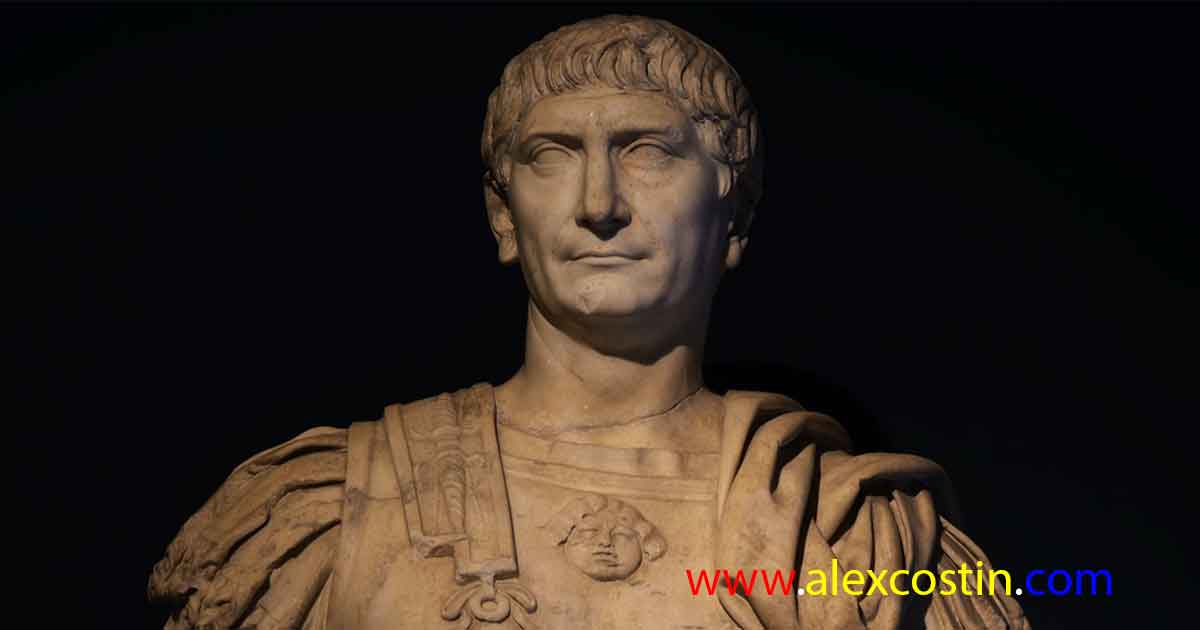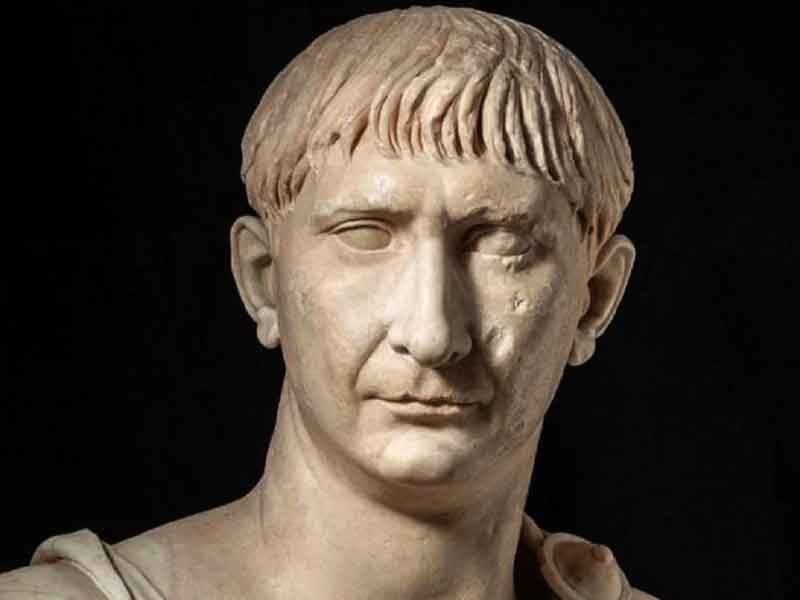🗡️ Just read about Trajan — one of Rome’s greatest emperors! His legacy of leadership, architecture, and expansion continues to inspire the world today. #History #Trajan #Rome
Trajan Biography
Trajan, Rome’s renowned emperor, ruled with vision and strength. This biography explores his life from humble beginnings to imperial greatness. Estimated read time: 8 minutes.

Born on September 18, 53 CE, in Italica, near modern Seville, Spain. His early life was shaped by military discipline and Roman values.
Died on August 8, 117 CE, in Selinus, Cilicia. His death marked the end of Rome’s greatest era of expansion.
Approximately 5 feet 11 inches. Described as imposing, athletic, and dignified in stature by ancient accounts.
Trajan Early Life and Background
Trajan was born into a prosperous military family in Hispania Baetica, one of Rome’s western provinces. His father, also named Marcus Ulpius Trajanus, held a distinguished senatorial career.
Growing up far from Rome, Trajan was deeply influenced by Roman law, discipline, and the ideals of civic duty. From a young age, he exhibited strong leadership and strategic thinking.
Trajan’s upbringing blended Roman tradition with provincial vigor, shaping him into a man respected equally for his modesty and authority.
He received his early education in Italica before serving in the Roman army, where he honed his administrative and military skills.
His provincial roots made him relatable to the common Roman citizen, bridging the gap between the elite and the governed.
Trajan Major Achievements and Milestones
Trajan is best known for expanding the Roman Empire to its greatest territorial extent, notably through the conquest of Dacia (modern-day Romania).
He initiated grand construction projects, including Trajan’s Forum, Trajan’s Market, and the triumphal Trajan’s Column, which stands as a testament to his military victories.
Under his rule, Rome experienced unprecedented prosperity, stability, and infrastructure growth, solidifying the empire’s strength and unity.
He launched extensive public welfare programs, focusing on roads, aqueducts, and housing for orphans and the poor.
His administration emphasized justice and civic responsibility, earning him the Senate’s honorary title “Optimus Princeps” — the best ruler.
Trajan Challenges and Struggles
Despite immense success, Trajan faced significant challenges, including managing the vast boundaries of an overextended empire.
Rebellions and unrest occasionally erupted in conquered territories, requiring diplomatic skill and decisive military response.
Health issues in his later years tested his endurance and forced him to balance governance with declining strength.
Maintaining harmony between the Senate, the army, and provincial leaders was a constant political balancing act.
Despite these struggles, Trajan’s leadership and resilience ensured his reputation as one of Rome’s most capable emperors.
Trajan Personal Characteristics and Relationships
Trajan was admired for his humility, discipline, and deep sense of duty. He often engaged directly with his soldiers and citizens.
He was known for his fair administration, generosity, and tolerance, reflecting a balanced and inclusive style of leadership.
His marriage to Pompeia Plotina was marked by mutual respect, and she played an influential role in promoting education and virtue at court.
He maintained loyal relationships with his advisors and ensured merit determined elevation within the military and government.
Even in power, he remained approachable and modest, earning the enduring affection of the Roman people.
Trajan Impact and Legacy
Trajan’s reign symbolized the zenith of Roman imperial achievement, blending military strength with civic compassion.
His architectural and engineering legacy continues to define Roman grandeur and innovation.
He set enduring standards for emperors who followed, becoming the model ruler by which successors were judged.
Trajan’s reforms and construction projects improved the welfare of millions and enriched Rome’s cultural heritage.
Modern historians regard him as a leader who combined justice, strength, and humanity, embodying the best of Roman ideals.

Trajan Summary
Trajan’s life was marked by ambition, wisdom, and an unwavering dedication to Rome’s prosperity and honor.
His reign represented the perfect blend of conquest, reform, and public service, earning him universal praise.
Even after centuries, his influence endures in governance, architecture, and ideals of leadership.
Trajan left behind more than an empire; he created a legacy of integrity and strength that continues to inspire leaders worldwide.
Explore Our Featured Websites
Discover trusted websites offering professional services in SEO, local promotions, outdoor adventures, and real estate.
SEO by TuneMyWebsite
Boost your organic traffic and keyword ranking with expert SEO optimization, fast-loading performance, and brand protection strategies.
Promote Barcelona
Promote your business across the vibrant city of Barcelona with tailored marketing and digital visibility campaigns that reach a local audience.
Aventura Girona
Experience adventure sports and canyoning tours in Girona, guided by seasoned professionals for thrill seekers and nature lovers alike.
2let2 Cardiff
Find your perfect property in Cardiff with 2let2, offering student accommodation and professional housing solutions in the heart of the city.